
At Vision Expo West 2025, Karen Michaelson, ABOC, led “Don't Be Left Out—Enhanced Visual Solutions for All Ages,” an education course focused on unveiling the various opportunities available to eyecare professionals to enhance patient lives through technology. The program encourages ECPs to identify vocational and avocational needs to craft “Perfect Visual Solutions,” or PVS, for all patients.
Eyecare Business: Can you share a bit about your background in the optical industry and how your experience has shaped your approach to technology and patient care?
Karen Michaelson, ABOC: I am a certified optician and owner of KARE Consulting and Eyes on Dementia. I've been in the industry for 46 years. I'll just say opticianry chose me when I followed in my father's footsteps. He's 99 now, and I believe he's probably one of the oldest dispensing opticians, as he dispensed until he was 93. So, from the moment I was exposed to opticianry and the tools that were at my disposal, I was really hooked. I dove into as much technology and learning as I could, and not for the sake of the trend or the gadgets, but really to unlock a deeper patient conversation and connection to be able to provide the best visual solutions possible as I worked through my career.
In 1999, I added eight dots to my life, which was actually a very simple career roadmap. I knew if I was going to stay in the industry as long as I have, I wanted to make sure that I did it with intention. It took me from the dispensing floor, practice management, consulting…I've even had an unfortunate run -in towith personal surgeries and procedures—a total of 15, which brought me into a part of the world I never really wanted to be—leadership, and advocacy.
With all of that being said, I'm in a phase of rewiring, not retiring. I work with the [Optical Women’s Association]. I am a board member ofn the United Opticians Association of America. [I’m] just really, really focused on bringing awareness and training and implementation with all of this incredible technology that we have in our industry.
EB: What are some of the processes you’ll be covering that clinicians may not be fully utilizing yet?
Michaelson: Over the years, I've had a front-row seat at the launch of many next-gen optical tools and lenses. I decided at Vision Expo that I really wanted to be able to unpack things that we're seeing now. While I don't feel like I have a cutting-edge technology to [discuss], what I'm doing is cutting-edge because it's really about the awareness, the understanding, and learning about the technologies that are right before us that we maybe just blink an eye at. I'm in the position to watch these unfold and use my background and skills to help create awareness. You can have the sharpest of technologies right before you, but if you don't see them, and they're not brought to you in a way that you can understand, it means nothing.
My cutting-edge superpower is bringing that to life to enrich lives and create the best solutions for patients. The course that I taught today was really meant to dive into all ages. I always say, “from womb to tomb,” and that really gets people thinking about what they're missing in their practice or in their daily work with patients. So, the technologies and lenses that we have that we didn't have 20 years ago, the augmented reality of different things that we have, the virtual reality of things, the technology for measuring…We're still using blue Sharpies and rulers! There's so much at our fingertips, and I just really want to bring that to the forefront and really scratch the surface and make people [aware] that there's so much that they're missing that could escalate and elevate the experience that they create for their patients.
EB: Why is now the right time for clinicians to elevate their approach to personalized visual care?
Michaelson: We're at a tipping point like we've never been on the fast-paced change in patient needs. We have an aging population. The technology is beyond anything that we could have comprehended, and care models can no longer be met with business as usual. Now, we've said that for years, but now is the time for clinicians to elevate that personalized experience. Every demographic demands we see a technology maturing that 10 years ago we couldn't have even dreamt of.
EB: What are the main takeaways you hope attendees will leave with after completing this course?
Michaelson: Patients are empowered with health literacy and [by] wanting to know more. But the reality of that with our patients and the technology that we have to help those people is beyond words. This is why clinicians and opticians and everybody else in our industry needs to have a roadmap for every one of those patients that walks in the door.
We need to push past the business walls surrounding us. We need to realize how much is at stake if [we] do not make the moves to have a future-first mindset.
Elevating the approach now isn't just a matter of staying current;, it's about differentiating the practice, deepening patient trust, and future-proofing your career and your business against the relentless industry change that we're seeing.
To learn more about elevating patient care, head to karenmichaelson.com.



